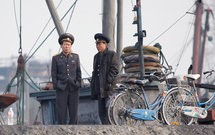 A lot has been happening in North Korean domestic politics as well as its relations with South Korea in recent months. Some of these happenings appear to indicate that there may be some improvement in the relationship between Pyongyang and Seoul. But some other events indicate that rivalry and hostility between them is not going to abate in the near future.
A lot has been happening in North Korean domestic politics as well as its relations with South Korea in recent months. Some of these happenings appear to indicate that there may be some improvement in the relationship between Pyongyang and Seoul. But some other events indicate that rivalry and hostility between them is not going to abate in the near future.
A day after North Korea threatened to wipe out South Korea, Kim Jong-un proposed to stop all slandering - in speech and in action - by both North Korea and South Korea, from 30 January 30 (beginning of the lunar new year). North Korea agreed to family reunions after seven years but kept postponing dates for one reason or another. The recent round of family reunions happened from 20 to 25 February. However, on 26 February, North Korea reportedly fired four missiles. These contradictory happenings pose serious challenges to our understanding about North Korean approach and intentions. North Korean peace gestures along with its contrary behaviour must be seen through a broad framework of inter-Korean rivalry.
At present, any North Korean reconciliation with South Korea will arise out of four important sources. First, North Korea may realise that the path of confrontation with South Korea is futile and their military and economic security would be better served if they cooperate with Seoul. Second, North Korea may respond to a sincere, sustained and long-term vision to co-exist as proposed by South Korea in its North Korea policy. Third, North Korea may have to address instability in its domestic political and economic domains and try to show its people that Kim Jong-un is the main driver in inter-Korean relations, which would provide legitimacy to him. Fourth, North Korea may be forced by external players, especially China, to cooperate and make peace gesture towards South Korea.
It seems that the recent North Korean peace gestures are driven not by the first two reasons, and domestic legitimacy and external pressure are the more probable reasons for its changed behaviour. Actually, North Korean survival strategy or intent towards South Korea has not changed much in these months and the execution of Jang Song-thaek means that reform and reconciliation with South Korea is not high on the North Korean agenda. Pyongyang is also sceptical about the South Korean trust politik as the policy seemingly demands trust from North Korea first and then promises to reciprocate. Thus, it is clear that North Korea has also not been responding to the South Korean trust-building process.
Basically, Pyongyang has been making peace gestures towards South Korea either to address its own domestic situation or to show the outside world, especially China, that it is positive and constructive in its rapprochement towards Seoul. The North Korean economy has been in bad shape for decades, and after another round of economic embargo following the Unha-3 rocket test in late-2012 and a third nuclear test in February 2013, economic conditions have further deteriorated. The much publicised execution of Jang Song-thaek also indicates that there are serious challenges to the political stability of the regime. By initiating a few peace gestures towards South Korea, Kim Jong-un wants to garner favourable international opinion and economic assistance. Moreover, if South Korea positively responds to North Korean gestures, it may be projected in North Korea as the result of the young leader’s initiatives, thus providing him with domestic legitimacy.
The pressure of China on North Korea to abandon or minimise its provocative actions and behaviours is also significant, and has made it increasingly difficult for China to support North Korea in the context of international pressure not to do so. In March-April 2013, hostility on the Korean peninsula reached a dangerous level in the wake of a joint military exercise between South Korea and the US and almost daily power-assertions across the 38th parallel between North and South Korea. It provided an excuse to the US to bring high-tech weapons and aircraft to the region and establish a missile defence system at Guam military base. It was dangerous to Chinese interests and China has been trying to push North Korea against any such escalation in future. North Korean peace gestures could also be linked to the Chinese factor.
The contradictions in North Korean behaviour exist because of being less genuine. It wants to show its own people and the outside world that it is constructive and seeks peace with South Korea. Since the initiatives do not emanate from any fundamental shift in its perception about itself or South Korea, there is an in-built inconsistency in its behaviour. North Korea must realise that a genuine peace gesture entails more consistent rapprochement with South Korea and this would only bring positive results for its economic, political and legitimacy deficit. South Korea has also to show that its trust politik is fundamentally different from the previous South Korean administration’s tough policy towards Pyongyang. It would be quite fruitful if Pyongyang makes more genuine peace gestures and Seoul responds more positively in dealing with North Korea.
By Special Arrangement with Institute of Peace and Conflict Studies (http://www.ipcs.org)